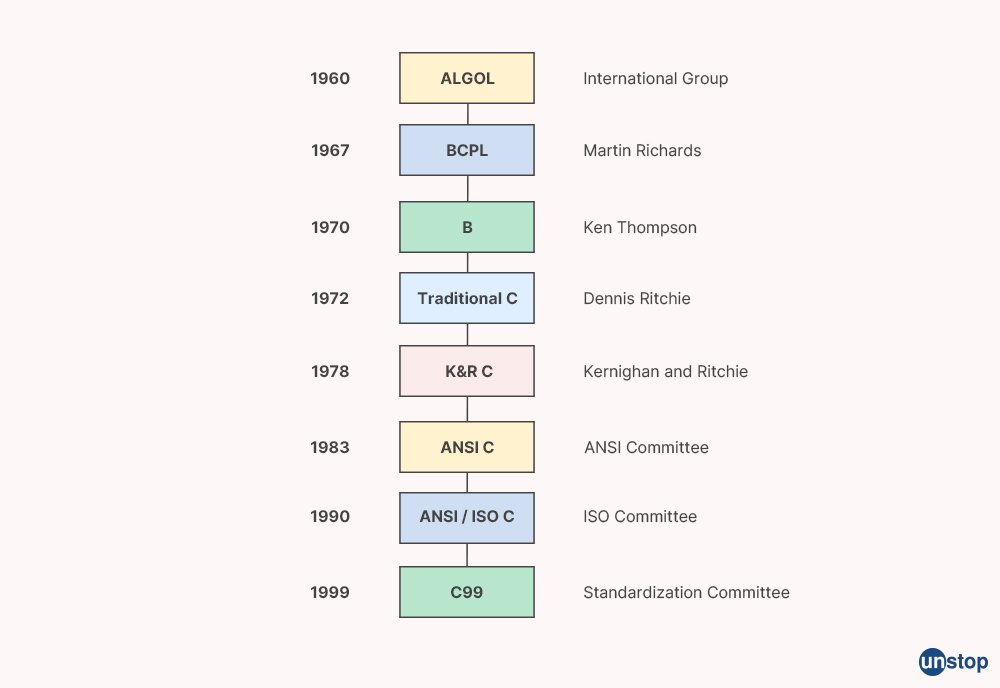Development Of C Programming Language
Category: C LANGUAGE | 5th October 2023, Thursday

The History Of The C Programming Language Is A Fascinating Journey That Traces Back To The Early 1970s. C Was Developed By Dennis Ritchie At Bell Laboratories (now Nokia Bell Labs), A Research And Scientific Development Company Owned By AT&T.
In The Late 1960s, Bell Labs Was Heavily Involved In The Development Of Multics, A Time-sharing Operating System Project. However, As The Project Faced Difficulties And Eventually Fell Apart, Ken Thompson, Dennis Ritchie, And Others At Bell Labs Decided To Create A Simpler And More Efficient Operating System For The PDP-7 Minicomputer. This Operating System Was Named Unix.
As Unix Development Progressed, It Became Evident That A High-level Language Was Needed To Make The System More Portable Across Different Computer Architectures. Ken Thompson Had Been Working On A Language Called B, Which Was A Simplified Version Of The BCPL Programming Language. Dennis Ritchie Then Further Developed B Into What Would Become The C Programming Language.
C Was Designed To Provide Low-level Access To Memory, Allowing Programmers To Write Efficient Code That Could Interact Directly With The Computer's Hardware. It Introduced A Concise Syntax And Powerful Operators While Retaining High-level Functionality. C's Simplicity And Efficiency Made It An Ideal Language For Developing System Software, And It Quickly Gained Popularity.
In 1973, Dennis Ritchie And Brian Kernighan Published "The C Programming Language," Also Known As The "K&R C," Which Became The Authoritative Reference For The Language. The Book Not Only Introduced C To A Wider Audience But Also Played A Significant Role In Its Widespread Adoption.
During The 1970s And 1980s, Unix Was Rewritten In C, Solidifying C's Reputation As The Language Of Choice For System Programming. The Portability Of C Allowed Unix To Run On Various Computer Architectures, Leading To Its Widespread Acceptance In Academic And Research Institutions. As Unix And C Became More Prevalent, They Influenced The Development Of Other Operating Systems And Programming Languages.

In The 1980s, The American National Standards Institute (ANSI) Established A Committee To Standardize The C Language, Resulting In The ANSI C Standard In 1989. This Standardization Ensured That C Programs Could Be Written In A Consistent Manner, Promoting Code Portability And Interoperability Across Different Systems.
The Influence Of C Extended Further With The Development Of C++. Bjarne Stroustrup, A Danish Computer Scientist, Extended C By Adding Object-oriented Programming Features, Creating C++. C++ Became Immensely Popular, Combining The Efficiency Of C With The Flexibility Of Object-oriented Programming.
Over The Years, C Has Remained A Foundational Language In Computer Science Education And Software Development. Its Influence Is Visible In A Wide Range Of Fields, From Operating Systems And Embedded Systems To Game Development And Web Applications. C's Legacy Continues Through Its Derivatives And Its Role As The Basis For Modern Programming Languages, Making It An Essential Part Of The History And Evolution Of Computing.
Tags:
Development Of C Programming Language, Development Of C Language
